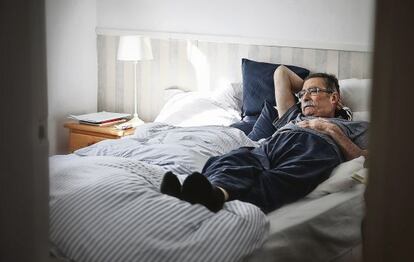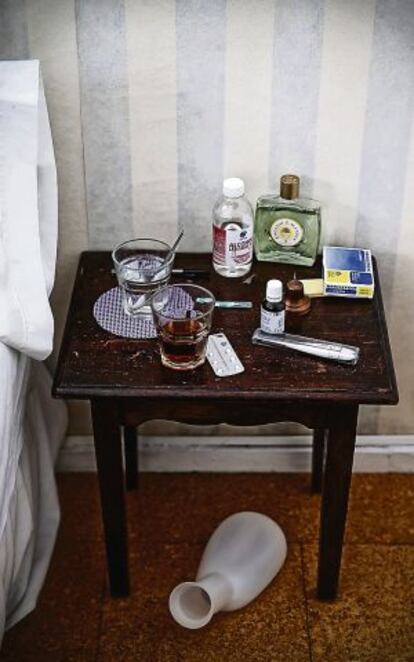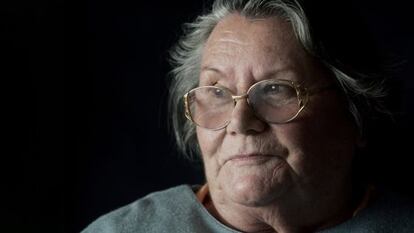“I want to die because I love life”
Terminal cancer sufferer José Luis had to fight the system before he could get access to sedation that would end his suffering

A t the age of 63, José Luis Sagüés, a retired university lecturer in German literature, had to fight the system to achieve his objective: "To decide when I die." In the end, he won his fight, with the help of Right to a Dignified Death (DMD). The NGO, which is run by doctors, assessed his condition, concluding that he was in a lot of pain and that his situation was irreversible. As such, it provided him with powerful sedatives, even though they would shorten his life, something that the palliative care services looking after him refused to do. "I want to say goodbye to my friends and family, after enjoying a last glass of wine."
One of the doctors with him in those final moments describes the scene as reminiscent of the French Canadian film The Barbarian Invasions, about a man dying from cancer whose family buys heroin on the black market to deal with his pain, eventually allowing him to overdose. "The family was gathered around him. We took some photos and we toasted. He said goodbye, and then we sedated him," says the medic.
Sagüés was angry at the failure of the Spanish health system to respect his wishes, and to allow him to die with dignity. Euthanasia is illegal in Spain, and terminal sedation - via DMD, or other means - is the only option available to terminally ill people who want to end their life before lapsing into unconsciousness and spending time on a life-support machine. He decided to tell the story of his final days to EL PAÍS.
The palliative care doctor tells me to hang in there, that my head is still OK"
Sagüés died on January 28. He had intended to wait until February 1, but after his conditioned worsened sharply two days beforehand, he decided to bring the fateful day forward. Doctors belonging to DMD certified him as suffering from "psychological and physical distress," and gave him a powerful sedative on January 27.
On January 24, Sagüés discussed his condition from his bed in an airy room in a house in the village of El Álamo, some 40 kilometers from Madrid, where he and his wife Concha used to spend their weekends and vacations. "This interview is very hard for me, it has taken all my strength to talk to you. There are times when I can barely speak," he says. The combination of morphine and amphetamines he has been given is affecting his speech, but not his thoughts, which remain lucid at all times.
"Here's the deal: when the palliative care doctor comes round, she tells me to hang in there, that my head is still OK. What she doesn't understand is that this is the very reason why I want to go now. I don't want to wait until I have been consumed, until I am unconscious. I have already been eaten up by this, but it's not enough for them," he says angrily. The doctors who cared for him in his final moments say that this is what he said the day before he died, after the relapse he had suffered the night before, which saw him trying to get out of bed, due to the distress he was feeling about losing control over the situation. "He didn't even bother asking the palliative care people to sedate him: he knew what the answer would be," says the doctor who finally provided him with the treatment he wanted.
The match has burned right down, and now it's burning my fingers"
Sagüés says his quality of life has worsened over the last year, effectively making him housebound. "The match has burned right down to the end, and now it's burning my fingers," he says.
After deciding he wanted to end his life when he believed the time had come, there were still occasions when he lost his nerve, and needed the support of his five brothers and sisters, as well as the rest of his family and friends, who all rallied round. Sagüés' sister, Regina, died aged 50 after a long illness, and was denied terminal sedation. "They tortured her. The man she was married to insisted that the doctors keep trying, even though it was no use. I didn't want to go through that."
"I want to die because I love life, because I am happy to be alive, and if you love life, you have to know how to die, it's part of the process. And I want to die happy. I am not unhappy now, I am not afraid. Life is better without fear. But all I am doing now is hanging on, the light hasn't gone out yet, because there is still a shred of life. But I don't want to wait until that shred is lost. I don't want things to go that far. I am already pretty far gone. I don't want morphine, nor the Church, nor palliatives," he says with clear conviction.
These younger doctors are incapable of looking you in the eye"
Describing himself as "atheist, Republican and Communist," Sagüés spent time in prison during the years of the Franco regime. "It was quite normal then; I'm not sorry at all for what I did. As Feuerbach said, the important thing is to try to change the world, and I'm satisfied with what I have done."

It's been a tough year, says Sagüés. "I began to feel unwell toward the end of 2012. I felt like I was drowning. We were in San Sebastián [his family is from the Basque city] for Christmas, and there was no way that I was going to the hospital. Instead, thinking that it might be my heart, I decided to go out for dinner: I had a huge steak, with salad, red peppers and wine, thinking that if all that had no effect on me, then it couldn't be my heart." He pauses for a moment, as though reliving and savoring that meal, adding: "I don't enjoy my food at all any more, the morphine makes my mouth feel as though it's stuffed with cotton wool, and I can't taste what I eat."
When he got back to Madrid, Sagüés went straight to his local hospital. "Little by little, test after test, I began to see that I had cancer. The question was to find out what type." In the end, the doctors came up with a diagnosis: "A grade four adenocarcinoma of the lung that had affected the heart cavity. They gave me 18 months to live, which is just about how long it's been. This is a genetic cancer, because I have never smoked, and have always exercised: cycling and canoeing."
I have sent letters to members of Congress calling for a law allowing euthanasia"
When he got the results, Sagüés says he threw himself into life with renewed vigor, determined to keep fighting until the end. "In March I married Concha. We had lived together for years, and I wanted to make sure that she was able to get a better pension when she retired. I wasn't looking my best: the medication had produced all kinds of sores. We held the ceremony on April 14, Republic Day: it's a tradition with us," he says.
He laughs as he remembers the day he began his medication. "They told me that I had to take a tablet at 8am. So I set the alarm, and when it went off, I got up, put on a CD of the national anthem of the former Soviet Union, and with a clenched fist, took my medicine." The next day he decided on a different approach: "I realized that I was being irrational, and that there was nothing to joke about, or to be heroic about. So instead I put on a lovely CD of Javier Krahe playing Georges Brassens."
After three months, the tests showed that the treatment was not working, and he began a new course of medicine. "But these produced the worst kind of side effects you can imagine," he says. "And it made me angry. I told the doctors that I was stopping the treatment, because it wasn't helping. But they insisted that I continue, that this was the way things worked. The way things worked! That's the thing about doctors. They are incapable of seeing a person as a whole. What do I care about the way things worked? I was going to die. Doctors know a lot about their area of specialization, but these younger doctors, who are so efficient, are incapable of looking you in the eye. They lack courage. The enlightenment has not reached medicine. They are still hanging on to Hippocrates, who died 2,000 years ago, and haven't read Kant - or if they have, then they failed to understand what he was saying. I tell them to dare to think, to think with their heads."
I knew that I wanted to manage my time, the time left to me, as I saw fit"
That said, Sagüés has few complaints about the Spanish national health service. "The nurses have all been magnificent. They are the backbone of the system. And I got on well with the doctors. They were always open about what was going on. They knew that they were dealing with somebody who is able to accept the truth. The problem is the system, which doesn't allow them to think things through. I have been slowly going downhill, to the point that I can now barely get up. I can't even make it to the dinner table any more. And yet the palliative care people say that I have to keep on trying, that I am still compos mentis. What they don't understand is that I want to be the one to decide that. It is my right. A person has the right to decide when he or she is going to die, and we will win that right. And we have to fight the fight with a smile on our faces."
Sagüe's decline has been rapid, but he has stuck to the promise he made to himself to enjoy the last months of his life to the maximum. Eighteen months ago, soon after he was diagnosed, he took a canoeing trip in the Basque Country, paddling down river into the bay of San Sebastián. "I wanted to see the mountains from the sea, I took part in the summer regatta. I had a fantastic time," he explains.
But in the final months of his life he has barely been able to manage a laptop computer. "When I feel up to it, I will go online and send letters to members of Congress calling on them to pass a law permitting euthanasia and the right to a dignified death. But nobody bothers replying. I had no illusions about the Popular Party, but I am disappointed that the left has dropped the issue. [Former Socialist Prime Minster] Zapatero raised the matter in Congress a couple of times... We are talking about a human right, it's not about politics - this is something that affects all of us," he says.
Sagüés has made the arrangements for a small party after he has gone
Sagüés explains that the only hope for people in his situation is DMD, which he contacted a few months ago. "These people have my deepest respect for fighting the good fight. It is incredible that we have people in government who still believe in mumbo jumbo to try to solve our problems," he says, laughing bitterly at Interior Minister Jorge Fernández Díaz's recent appeal to Saint Teresa to come to Spain's aid at her time of need. "The people at DMD are working to help people, fighting for all our rights. Not like the government, which calls anybody who supports euthanasia a Nazi," he says.
Mention of Spain's political class, and his frustration at the refusal of the country's elected representatives to debate euthanasia, leads Sagüés back to the reason for the interview: "Right from the moment I was diagnosed, I knew that I wanted to manage my time, the time left to me, as I saw fit. There are a lot of things that I cannot do, but I can still sit and talk with the people I love. I am not afraid. And when the time comes I will gather my family around me and we will enjoy a glass of wine before they sedate me. I want to decide. I am sick of being told what to do. Who are these people who think they have the right to save you when you don't want to be saved?"
Sagüés says that he has made the arrangements for a small party after he has gone. "I want everybody to let a little time go by, to mourn. And then, on April 14, I would like everybody to meet at the bar where we held our wedding reception, and to throw a party there. I want them to sing The Internationale, or at least the first verse, which is about all anybody knows anyway. And not too many speeches: after all, I'll already be gone.
"It's better to get these things over quickly, isn't it?"
The fight for a dignified death

- Ramón Sampedro, whose life story was told in the film The Sea Inside, raised awareness about the plight of people suffering from terminal illness - or, in his case, those who have lost the use of all their limbs and torso, and have decided they want to end their life. After spending 25 years confined to his bed, during which time he campaigned for the right to a dignified death, Sampedro committed suicide in 1998 by taking cyanide. As he was unable to administer the poison himself, his friends and family came under police investigation. His life partner Ramona Maneiro was formally charged, but was later acquitted by the courts. Helping somebody to commit suicide is illegal in Spain, although in cases involving the terminally ill, judges are usually reluctant to pass sentence.
- Madeleine Z committed suicide at the age of 69 in 2007 after a lengthy disease of the central nervous system that was gradually leaving her paralyzed. She took an overdose of several drugs that doctors had recommended to her. Medically assisted suicide is only legal in Switzerland, and the Spanish police investigated the case, but decided not to bring charges against anybody involved.
- Pedro Martínez died in 2011 after being given terminal sedation. He had been suffering from amyotrophic lateral sclerosis - also known as Lou Gehrig's disease - which affects the nerve cells in the brain and spinal cord that control voluntary muscle movement. Faced with death from gradual asphyxiation, and in great pain, he was given painkillers that brought on his death. Terminal sedation is legal in Spain, and was formally requested by José Luis Sagüés. - Inmaculada Echevarría convinced her medical team to disconnect her from a life-support machine. Ending therapeutic care in this way, when requested by the patient, is legal in Spain, and has considerable support within the medical profession.
- Euthanasia. This consists of prescribing drugs to a patient suffering from a terminal illness with the aim of ending their life. This is legal in the Netherlands, Belgium, and Luxembourg, as well as in Australia, and in some states in the US.
Tu suscripción se está usando en otro dispositivo
¿Quieres añadir otro usuario a tu suscripción?
Si continúas leyendo en este dispositivo, no se podrá leer en el otro.
FlechaTu suscripción se está usando en otro dispositivo y solo puedes acceder a EL PAÍS desde un dispositivo a la vez.
Si quieres compartir tu cuenta, cambia tu suscripción a la modalidad Premium, así podrás añadir otro usuario. Cada uno accederá con su propia cuenta de email, lo que os permitirá personalizar vuestra experiencia en EL PAÍS.
En el caso de no saber quién está usando tu cuenta, te recomendamos cambiar tu contraseña aquí.
Si decides continuar compartiendo tu cuenta, este mensaje se mostrará en tu dispositivo y en el de la otra persona que está usando tu cuenta de forma indefinida, afectando a tu experiencia de lectura. Puedes consultar aquí los términos y condiciones de la suscripción digital.








































